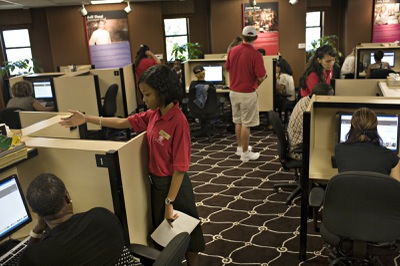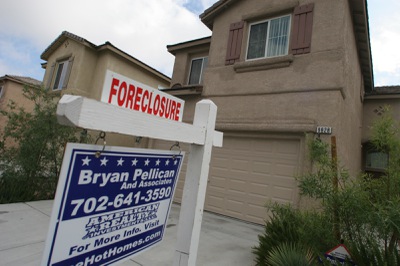Wednesday, June 16, 2010 | 2 a.m.
Related document
Sun Coverage
Sun archives
- Report: 2011 rebound expected, but full recovery years away (6-15-2010)
- State presents spending plan to stabilize housing market (6-11-2010)
- May foreclosure filings down, but Nevada still ranks No. 1 (6-9-2010)
- Retail recovery around the corner (6-4-2010)
- Las Vegas building boom? There is no building boom (5-28-2010)
- Reich: Be patient about economy (5-28-2010)
- Q&A: Linda Rheinberger, Nevada Association of Realtors (5-28-2010)
- 25 jobs leaving Henderson with Ethel M reorganization (5-21-2010)
- Foreclosures on land pushing prices back to 2003 levels (5-21-2010)
A new report that paints a bleak picture of economic performance in Las Vegas notes that the valley had the sharpest unemployment rate increase among the nation’s 100 largest metropolitan areas from March 2009 through March of this year.
That 3.2 percentage-point increase is but one of many negative statistics tied to Las Vegas in a report that shows just how far behind the city remains in its quest to catch up with other cities on the road to recovery from the Great Recession.
The findings were released Tuesday in a quarterly report by Brookings Mountain West, a partnership of the Brookings Institution think tank in Washington and UNLV. The report focuses on economic trends as of March in the Intermountain West: Nevada, Arizona, Utah, Idaho, Colorado and New Mexico.
One of the report’s major conclusions is that the Intermountain West, which usually creates more jobs following recessions than other regions, cannot make the same claim this time. The region, in fact, saw its economy weaken over the first three months of this year.
“In short, for the first time in three decades the region finds itself unable to lead the nation out of a recession and forced into a period of serious questioning about the sources of future growth with further federal stimulus unlikely,” the report stated.
Intermountain states include 10 of the nation’s 100 largest metropolitan areas. But Las Vegas is the only one that ranked among the nation’s bottom 10 in four key economic categories:
• Third from the bottom with a 53.9 percent drop in housing prices from the first quarter of 2007 through the first quarter of this year.
• Fifth from the bottom with 13.8 percent fewer people employed as of March compared with the second quarter of 2007.
• Sixth from the bottom with an unemployment rate that was 9.5 percentage points higher in March than it was in March 2007, when the unemployment rate was 4.2 percent.
• Ninth from the bottom with a 4.2 percent decrease in gross metropolitan product — a measurement of goods and services produced by the city — from the fourth quarter of 2007 through March.
The only bright spot for Las Vegas was that its inventory of foreclosed homes that failed to sell at auction and are now owned by lenders declined in this year’s first quarter, the only major Intermountain city to make that claim. But the report downplayed that, noting Las Vegas had a large number of foreclosed homes to begin with and that the decline occurred at a slower pace than in the previous three months.
If anything, the picture for Las Vegas could get even grimmer by the time the next Brookings quarterly report is released. One reason is that the city’s unemployment rate hit a record 14.2 percent in April, according to the Nevada Employment, Training and Rehabilitation Department. That translated to 140,900 individuals out of work, a figure that doesn’t include part-time workers or people who have given up hunting for jobs.
In April, the median sales price of existing homes in Las Vegas rose less than 1 percent compared with the same month a year ago, according to the real estate tracking firm SalesTraq. And April’s median price, $126,000, was still lower than the median price of early 2009.
Why is Las Vegas, a city that prided itself on rapid recovery from prior recessions, in much worse shape overall than most other cities when it comes to a rebound?
Brookings fellow and Policy Director Mark Muro, co-author of the report, said it has much to do with the city’s dependence on sectors such as tourism and real estate, which rely heavily on consumer spending. Many consumers simply cannot afford to spend the amount of money they once did because they are underwater on their mortgages or drowning in debt, much more so than in prior recessions. Still others are unwilling to spend because they are worried about their jobs.
“When household consumption fell off the table during this latest recession, Las Vegas was inordinately hurt,” Muro said. “The uncertainty about the economy is also causing employers to delay hiring.”
Strangely, Las Vegas experienced a slight uptick in its gross metropolitan product over the past quarter while its unemployment rate also rose, according to Brookings. Muro said that could be explained by technological advances that made workers more efficient. But he added: “You also have workers who are willing to work more given the possibility of being laid off.” And the increase in the gross metropolitan product was a “still feeble” three-tenths of a percent, the report noted.
Nothing in the report surprised economic analyst John Restrepo, principal of Restrepo Consulting Group in Las Vegas.
“It’s not surprising because we have an economy that’s not particularly diversified,” Restrepo said. “The educational level of our workforce is lower than in other cities, which means we have a less employable population. And we have industry that is heavily dependent on consumer spending and consumer confidence.
“Hopefully, we’ve learned a valuable lesson, the importance of having a sustainable economy with investment in social and economic infrastructure. We also learned that hubris is a dangerous quality to have.”
The Nevada Development Authority, which recruits businesses to the state, actually sees advantages in some of the bad statistics. President and CEO Somer Hollingsworth said his organization uses the high unemployment rate and relatively inexpensive housing prices in Las Vegas as recruiting tools to lure out-of-state businesses here. The logic is that a high unemployment rate means a large and willing labor pool to choose from, coupled with affordable homes for the company’s employees.
In May, Hollingsworth said the authority had visits from 42 out-of-state businesses, far more than the 10 to 15 visits in a typical month.
“What we saw last year was that everyone was panicked to make a move,” he said. “But people are sniffing a recovery out there and the things that made Las Vegas great are still here.”
For Las Vegas to achieve a sustainable recovery, though, Muro said the city will have to diversify its economy, citing clean energy as an example.
“You’ll have to diversify over the next 10 years because we’re certainly not going to go back to the economy we had in 2007,” he said.



Join the Discussion:
Check this out for a full explanation of our conversion to the LiveFyre commenting system and instructions on how to sign up for an account.
Full comments policy